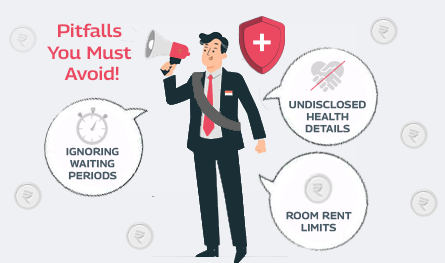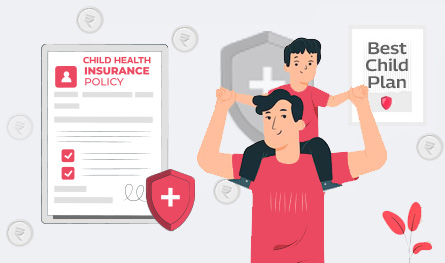Related Articles
 Jan 08, 2025
Jan 08, 2025
Is Varicose Vein surgery covered under the health insurance policy in India
 Health Insurance
Health Insurance
.png)
It now sounds cliched to say how health insurance is important to your financial security during medical emergencies. It is time to get more specific about the policies that suit your needs. Need assessment helps you to pinpoint the benefits you require and also foresee your requirements shortly. Two very prominent types of health insurance are critical illness and maternity insurance.
They both cover very different needs, so it is essential to know which one to prioritise when. One should be prioritised over the other based on certain key aspects like age, coverage requirement, stage of life, benefits and renewal facilities.
.png)
When it comes to health insurance planning in India, two major concerns stand out: critical illness coverage and maternity insurance. While both serve different purposes, knowing which one to prioritise depends on your financial situation, life stage, and risk factors.
Let’s break down the key differences, their importance, and how to make the right decision.
Critical illness insurance provides a lump sum payout if you are diagnosed with a serious, life-threatening disease such as cancer, heart attack, kidney failure, or stroke.
Features of Critical Illness Insurance:
Every insurer has different inclusions and exclusions.
Given the rising treatment costs, ₹10-20 lakh coverage is ideal for metro cities.
Critical illness can be a standalone plan or an add-on rider with life insurance. A standalone plan offers broader coverage.
Some insurers require a 30-day survival period after diagnosis before paying the claim.
Maternity insurance covers pregnancy-related expenses, including delivery costs, pre-postnatal care, and newborn expenses. It is usually offered as an add-on cover with health insurance as there are no standalone maternity insurance plans available in India.
Features of Maternity Insurance:
Since most plans have a 2-4 year waiting period, purchase coverage well in advance.
Some policies include vaccinations and NICU charges, while others do not.
Ensure adequate coverage for both delivery types.
Like any other policy, choosing maternity insurance or a critical illness policy requires an assessment of your financial status, health condition, lifestyle and the number of dependents in your family. It is, after all, an investment in your health for planned or unplanned events.
The significant difference between these two conditions is the preparedness that you may have to deal with them. Usually, pregnancy is planned due to the extra lifelong expenses associated with it. Critical illness is primarily sudden and can upset your financial planning considerably.
As you can see, the objectives of both these insurances vary greatly, and one takes precedence over the other, depending on your life situation.
Prioritize Critical Illness Insurance as it provides a lump sum to manage medical and daily expenses.
Maternity Insurance is essential, but only if bought early due to waiting periods.
Critical illness insurance protects against life-altering diseases, while maternity insurance covers short-term expenses.
Both policies serve different needs, but if you can only afford one, critical illness insurance should take priority due to its long-term financial protection. However, securing maternity insurance early is the smart choice if you’re in the family planning stage.
Young and healthy? Find out which of these plans rewards you with lower premiums. Click here to check now!

Paybima Team
Paybima is an Indian insurance aggregator on a mission to make insurance simple for people. Paybima is the Digital arm of the already established and trusted Mahindra Insurance Brokers Ltd., a reputed name in the insurance broking industry with 21 years of experience. Paybima promises you the easy-to-access online platform to buy insurance policies, and also extend their unrelented assistance with all your policy related queries and services.


Health insurance plans are purchased with the hope of medical protection in times of need. However, sometimes it ends up being a source of surprise and disappointment. This mostly happens when people rush to buy health insurance plans, often overlooking essential aspects. Ignoring waiting period clauses, misunderstanding exclusions, and being unaware of sub-limits can lead to unwanted problems in the future.


Term insurance is an important investment. However, with the availability of so many insurers offering term plans, it becomes difficult to select the best term plan to suit your needs. Buying a term plan needs some consideration and research on the part of the policyholder. In this post, let us discuss the best term insurance providers in India.


If you think of life insurance, chances are you are picturing something people buy in their 30s or 40s. But what if you are 65 or older and just getting started? The good news is that you are never too late. Whether you are thinking of easing the financial burden on your family, covering final expenses, or simply leaving behind a legacy, there are life insurance options tailored just for you.
This article will be a guide to life insurance for senior citizens above 65 years, explaining why it is important, the type of insurance options, and how to get the right policy for you.


As any parent will tell you, kids come with two things: endless energy and absolutely no sense of self-preservation. From scaling chairs and tables like mountaineers to catching germs within a five-mile radius, kids really know how to keep everyone on their toes. Now, it is understandable you are worried. As much as we would love to wrap our small ones in cotton wool and keep them safe forever, real life has other plans.

.png)
It is very important to know the car insurance cost in India so that you can find the affordable policy that you are looking for in this case.
